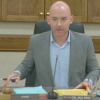A public health emergency has been declared by the B.C. provincial government following an increase in the number of drug overdoses over the past five years.
Provincial Health Minister Terry Lake said if more action is not taken to address the issue, 2016 could see between 600 and 800 overdose deaths.
During a press conference Thursday, Minister Lake, alongside provincial health officer Dr. Perry Kendall announced the province will exercise emergency powers that will allow medical health officers throughout B.C. to collect real-time information on overdoses in order to immediately identify where risks are arising. The information will be used to warn and protect people who are using drugs.

“Currently, we primarily only get overdose data if someone died and there is a lag time in getting that information,” said Minister Lake.
Every year since 2010, there has been a steady increase of overdose deaths in British Columbia. Dr. Kendall said there has also been a significant increase in the number of deaths where fentanyl was present. In 2015, fentanyl was found in around one third of the deaths reported.
A total of 474 deaths from drug-over doses occurred in the province last year. That number is almost twice the number of individuals who died in motor vehicles crashes in the same year.
“We have determined that in order to provide an enhanced response, a key need is for more information and more detailed information on the who, the where, and the when of these tragic incidences,” explained Dr. Kendall.
For the first time in any Canadian province, information regarding the circumstances of an overdose will be reported as quickly as possible to a regional health authority’s medical health officer. The information will come from the emergency personnel or health care worker who initially responded to the overdose.
Dr. Kendall assured that all the collected data will be treated as confidential medical records and protected as such.

“The purpose of collecting this data is to provide assistance and help, and prevent further overdoses.”
The goal is to use the collected data to help provide additional support to regional health authorities, to target interventions to higher-risk communities. It can also be used to issue bad drug warnings, awareness campaigns and distribution of naloxone training and kits.
Last year, there were a total of 60 deaths from drug overdoses in the Interior region. In 2016, the Interior is already over halfway to that number, with 39 illicit drug overdose deaths recorded between Jan. 1 and Mar. 31, 2016.
“These deaths have a serious impact on public health and numbers are usual and unexpected, which is a criteria for declaring a public health emergency,” said Dr. Kendall.
Dr. Kendall said over the next few weeks he will begin working with medical health officers, health authorities, emergency room staff and first responders to determine how to best collect and share information.
















